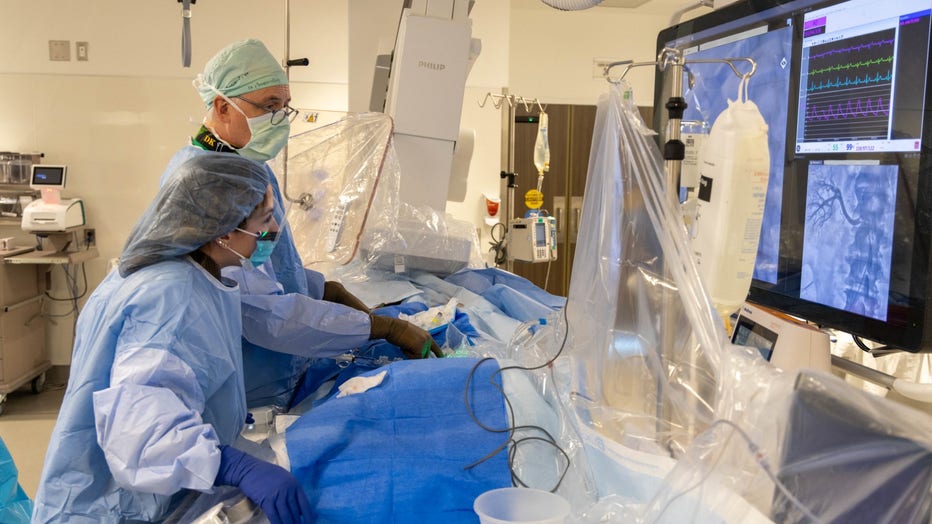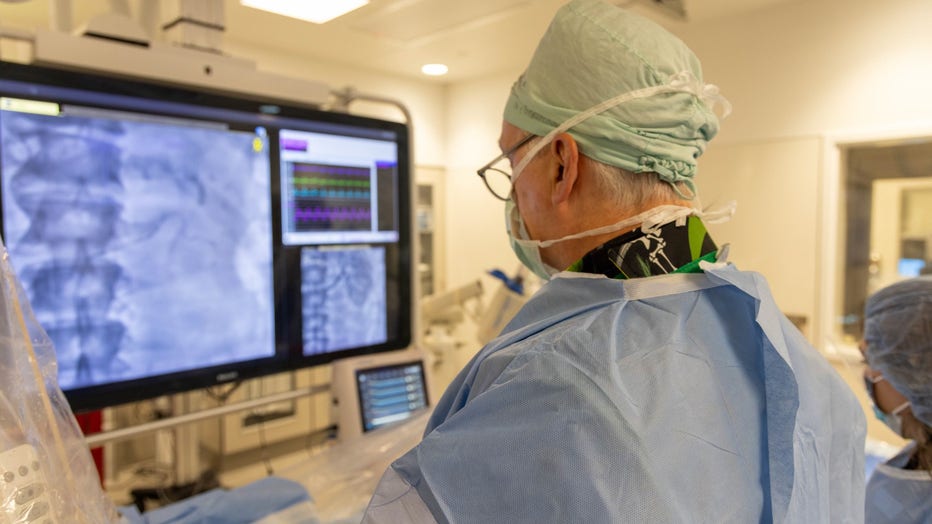High blood pressure for millions of Americans could be helped by new one-time procedure

New way to control high blood pressure
High blood pressure can be controlled using a new method at Piedmont Hospital in Atlanta. It may be able to replace medications.
ATLANTA - At 69, Paul Griffin of Newnan has been living with high blood pressure for about 25 years.
Diagnosed in his early 40s, Griffin's doctor put him on a drug that, he says, caused some negative side effects.
So, we added a second medicine," he says. "Then, the second medicine became three."
Soon, Griffin was juggling four blood pressure drugs, which gave him better control, but his numbers were still too high, leaving him at risk of having a stroke or heart attack.

Penny and Paul Griffin at home in Newnan, Georgia. In 2022, Paul Griffin underwent a renal denervation procedure to lower his blood pressure as part of a clinical trial at the Piedmont Heart Institute in Atlanta. (FOX 5 Atlanta)
What is renal denervation?
Then, a couple of years ago on Facebook, Griffin read about a study at the Piedmont Heart Institute of a new one-time procedure that might finally lower his blood pressure.
"I thought, if I could get rid of the expense, the aggravation of having to take drugs every day, if I could get rid of it, I should at least look into it," he says.
Dr. David Kandzari, chief of the Piedmont Heart Institute in Atlanta, was the lead principal investigator of the trial evaluating Medtronic's Symplicity Spyral™ renal denervation system, which was granted FDA approval in November 2023.

Dr. David Kandzari, Chief of the Piedmont Heart Institute, performs a renal denervation procedure at Piedmont Hospital in Atlanta.
"The ideal candidates are individuals who remain with persistent, uncontrolled high blood pressure despite attempts for lifestyle interventions, such as reducing salt intake, exercise, weight loss, cessation of smoking," Kandzari says.
That includes people, like Griffin, who are on blood pressure-lowering medication, but whose blood pressure is still consistently at 150/90 or above.
Dr. Kandzari performed the first renal denervation procedure in the U.S. in late November, about 10 days after the FDA cleared the device to treat high blood pressure.

Dr. David Kandzari, Chief of the Piedmont Heart Institute, performs a renal denervation procedure at Piedmont Hospital in Atlanta. (Piedmont Healthcare )
How does renal denervation work?
The hospital recorded a video to show how the one-hour procedure works.
In a cath lab, with the patient sedated, Dr. Kandzari focuses on overactive nerves around the exterior of the patient's renal arteries, which, he says, are signaling to the heart and brain to increase blood pressure.
"We insert a catheter up to the level of the kidney arteries," Kandzari says.
There, Dr. Kandzari delivers radio frequency energy to heat up and ablate the overactive nerves.
"This energy does not traumatize the kidney, the wall of the kidney artery or the blood vessel itself," Kandzari explains. "But it does disrupt or ablate the nerves that circumferential spiral around the exterior of the kidney artery. And, again, by interrupting that telegraph system between the kidneys and the central nervous system, quite meaningful blood pressures can be achieved."
Does renal denervation work?
Griffin had his renal denervation at Piedmont Atlanta April 14, 2022, as part of the clinical trial.
"There was no pain associated with it," he says. "And, I had positive results almost immediately after the procedure was done.
The study required him to stay on his blood pressure medication for at least 6 months, but, Griffin says, his numbers began to steadily drop.
Just over 20 months later, Griffin is down from taking four blood pressure medications to taking one, and his blood pressure is averaging 118/81, ideal for his age.
He is hopeful his cardiologist will be able to wean him off the one pill he is still taking over the next few months.
"If I can get back into a normal range, where I don't have to take medication, that would be awesome," Griffin says.
There were questions about whether the ablated nerves could grow back, causing blood pressure to rise again.
So far, Kandzari says, that has not happened.
How long does renal denervation last?
The blood pressure-lowering effect of renal denervation in this study lasted up to 3 years.
Other countries in Europe and Asia, he says, now routinely use renal denervation to treat high blood pressure in patient who have not responded to medication or lifestyle changes.
"And, importantly, even modest reductions in blood pressure translate into quite meaningful, relevant reductions in events that include heart failure, end stage kidney disease, stroke, heart attack and death itself," Kandzari says.
As a paramedic years ago in Macon, Paul Griffin says he met many stroke patients and saw how they struggled.
Griffin says he used to worry that, with his high blood pressure, he would one day have a stroke, too, but not anymore.
"That is not in the back of my mind right now," Griffin says. "That doesn't haunt me like it used to."

